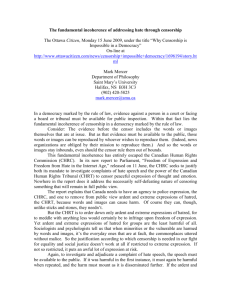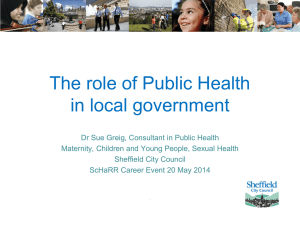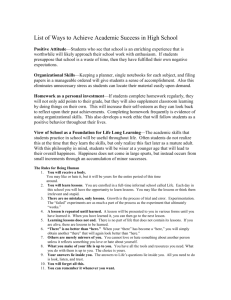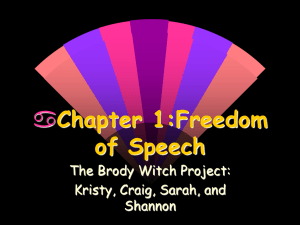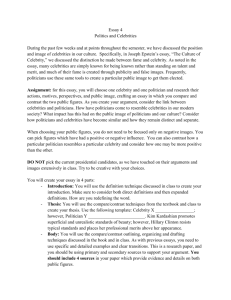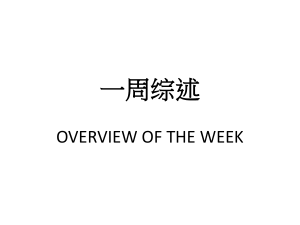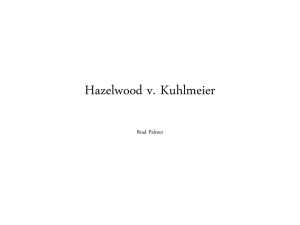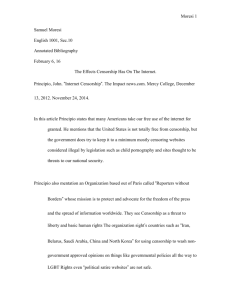Media Ethics - Geoff Barton
advertisement
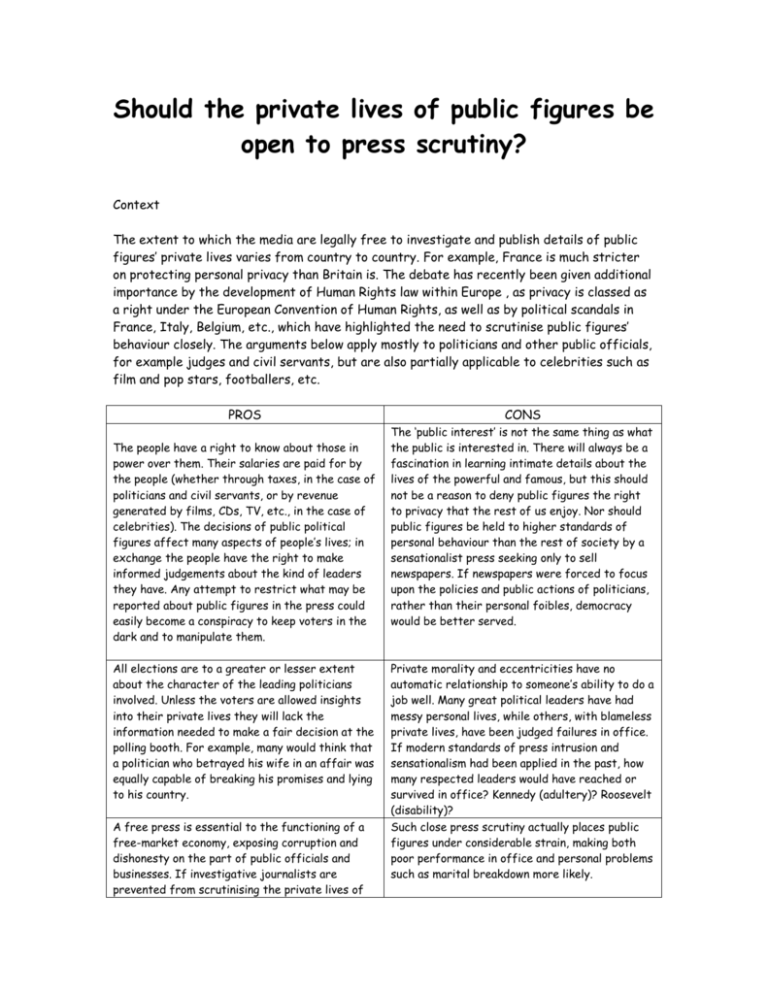
Should the private lives of public figures be open to press scrutiny? Context The extent to which the media are legally free to investigate and publish details of public figures’ private lives varies from country to country. For example, France is much stricter on protecting personal privacy than Britain is. The debate has recently been given additional importance by the development of Human Rights law within Europe , as privacy is classed as a right under the European Convention of Human Rights, as well as by political scandals in France, Italy, Belgium, etc., which have highlighted the need to scrutinise public figures’ behaviour closely. The arguments below apply mostly to politicians and other public officials, for example judges and civil servants, but are also partially applicable to celebrities such as film and pop stars, footballers, etc. PROS The people have a right to know about those in power over them. Their salaries are paid for by the people (whether through taxes, in the case of politicians and civil servants, or by revenue generated by films, CDs, TV, etc., in the case of celebrities). The decisions of public political figures affect many aspects of people’s lives; in exchange the people have the right to make informed judgements about the kind of leaders they have. Any attempt to restrict what may be reported about public figures in the press could easily become a conspiracy to keep voters in the dark and to manipulate them. All elections are to a greater or lesser extent about the character of the leading politicians involved. Unless the voters are allowed insights into their private lives they will lack the information needed to make a fair decision at the polling booth. For example, many would think that a politician who betrayed his wife in an affair was equally capable of breaking his promises and lying to his country. A free press is essential to the functioning of a free-market economy, exposing corruption and dishonesty on the part of public officials and businesses. If investigative journalists are prevented from scrutinising the private lives of CONS The ‘public interest’ is not the same thing as what the public is interested in. There will always be a fascination in learning intimate details about the lives of the powerful and famous, but this should not be a reason to deny public figures the right to privacy that the rest of us enjoy. Nor should public figures be held to higher standards of personal behaviour than the rest of society by a sensationalist press seeking only to sell newspapers. If newspapers were forced to focus upon the policies and public actions of politicians, rather than their personal foibles, democracy would be better served. Private morality and eccentricities have no automatic relationship to someone’s ability to do a job well. Many great political leaders have had messy personal lives, while others, with blameless private lives, have been judged failures in office. If modern standards of press intrusion and sensationalism had been applied in the past, how many respected leaders would have reached or survived in office? Kennedy (adultery)? Roosevelt (disability)? Such close press scrutiny actually places public figures under considerable strain, making both poor performance in office and personal problems such as marital breakdown more likely. public figures, then corruption and crime will be much easier to hide. For example, just how does a senior civil servant afford a Ferrari, a yacht and a villa in Monaco on his government salary? No clear dividing line can be drawn between public and private behaviour – drawing up rules will be arbitrary and will exclude at least some corrupt or dishonest behaviour of bearing. For example, President Mitterand of France hid his cancer from the French electorate for years – was this a public or a private matter? He also had a mistress and illegitimate daughter, who were secretly taken on some of his foreign visits at state expense; again, is this a private or a public matter? Many politicians (and religious leaders) make an explicit or implicit campaign point out of their family values and other aspects of their “private” life, for example by being photographed with their loyal family, and through policy stands on such issues as divorce, single mothers, sex education, drugs, etc. If the public image such people seek to create is at variance with their own practice, such hypocrisy deserves to be exposed. Public figures seek this status knowing that it will bring attention to their private lives – pop stars, footballers, etc. Constant scrutiny is the price of fame. Many celebrities actively seek media exposure in order to advance their careers, revealing many aspects of their personal lives; once success has been bought in such a fashion it is hypocritical to complain of “press intrusion” into those few aspects the star would prefer to remain hidden. Continual probing into the private lives of public figures actually harms the functioning of democracy. Very few potential candidates will have entirely spotless private lives, free from embarrassing indiscretions committed while young and irresponsible. The prospect of fierce and unforgiving press scrutiny will thus deter many from seeking public office and deny their talents to the public good. Those who do present themselves for election will therefore tend to be rather unrepresentative individuals of a puritanical nature, whose views on sex, family life, drugs, etc. may be skewed and intolerant as a result When personal morality and family life is deliberately and explicitly used by a politician as a reason for them to be elected, then they have chosen to make it a public issue rather than a private one. This does not justify intrusion into the privacy of those politicians who do not parade their personal lives as a campaign method. Many public figures achieve celebrity status largely by mistake; it is a by-product of their pursuit of success in their particular field. For example, most professional footballers wanted when young simply to become the best player they could be, at the highest level they could reach. They do not wish to be “role models” and claim no special moral status, so why should their private lives be subjected to such public scrutiny? Write about: “Public figures are entitled to private lives” Those who choose to live life in the public eye must accept that the media spotlight will pursue them. Do you agree? When does public interest in celebrities become harassment? Is it ever right for Governments to restrict freedom of speech? Freedom of speech is often considered to be one of the most basic tenets of democracy. As a fundamental right it is enshrined in documents such as the Bill of Rights in the United States, the United Nations Declaration of Human Rights, and the European Convention on Human Rights. PROS CONS Free speech is an inherently ambiguous concept that requires definition and interpretation; Government is the obvious place for such clarifications to be made. Governments should be distrusted. (a) Many political theorists argue that checks and balances need to be put in place in order to prevent Governmental abuse. The right to freedom of speech is too important to leave in the hands of Government. (b) An independent judiciary, or politically-independent body for assessing such circumstances is the only place that can effectively guarantee. Irrespective of its US provenance, we recognise that "the most stringent protection of free speech would not protect a man in falsely shouting fire in a theatre and causing a panic." (Schenck v. United States, 3 March, 1919). Thus shouting fire in a crowded cinema when there is no fire, and you know it, is wrong. We accept this limit on free speech, therefore the principle is conceded. "After all, the practical reason why when the power is once in the hands of the people, a majority are permitted, and for a long period continue, to rule is not because they are most likely to be in the right, nor because this seems fairest to the minority, but because they are physically the strongest" - CIVIL DISOBEDIENCE, H D Thoreau. Tyranny of the majority is as good a reason as any to prevent Government from being involved in censorship the majority of the population may be antihomosexuality, or anti-immigrant, or indeed progenetically modified foods. In a healthy democracy it is vital that smaller groups be heard, and there is no way to guarantee these voices if the Government can restrict free speech. Speech acts lead to physical acts. Thus pornography, hate speech and political polemic are causally linked to rape, hate crimes, and insurrection. Society is self-regulating. (a) The link between speech acts and physical acts is a false one people who commit hate crimes are likely to have read hate speech, people who commit sex crimes are likely to have watched pornography but not necessarily the other way around. Viewers of pornography and readers of hate speech are therefore not incited to commit anything they otherwise would not do. (b) Exposing pornography, hate speech and political polemic (extreme nationalism etc.) to society increase the likelihood that it will be discredited and defeated, rather than strengthened through persecution. This is Milton’s argument from "Areopagitica" (1644) truth will combat error. Government must protect its citizens from foreign enemies and internal enemies - thus freedom of speech can be acceptably curtailed during times of war in order to prevent propaganda and spying which might undermine the national interest. The government may well wish to suppress publication of information that would be prejudicial to its success in the next elections or its war campaign, but it’s in the public interest to know about their dirty dealings or illegal activities. Some intellectual views are antithetical to beliefs held by major religions. In order to protect the religious from these views, we should prevent people from saying these offensive things. Although some views that may be expressed might be contrary to religious teaching, we must defend the rights of the non-religious within any society too. We need to protect minors (those under the age of majority) from exposure to obscene, offensive or potentially damaging materials. Arguments that invoke censorship of materials for minors are just that - arguments for the censorship of materials for minors. They do not concede the general principal that censorship is good because until the age of majority the state acts in loco parentis and must act as a conservative parent at that. Write about: “The internet should be subject to the same editorial controls as other forms of media”. Do you agree? Media owners should have the right to say what they like. If people disagree, they don’t have to read or watch. Censorship is an essential ingredient in a secure democratic society. GB March 3, 2016

